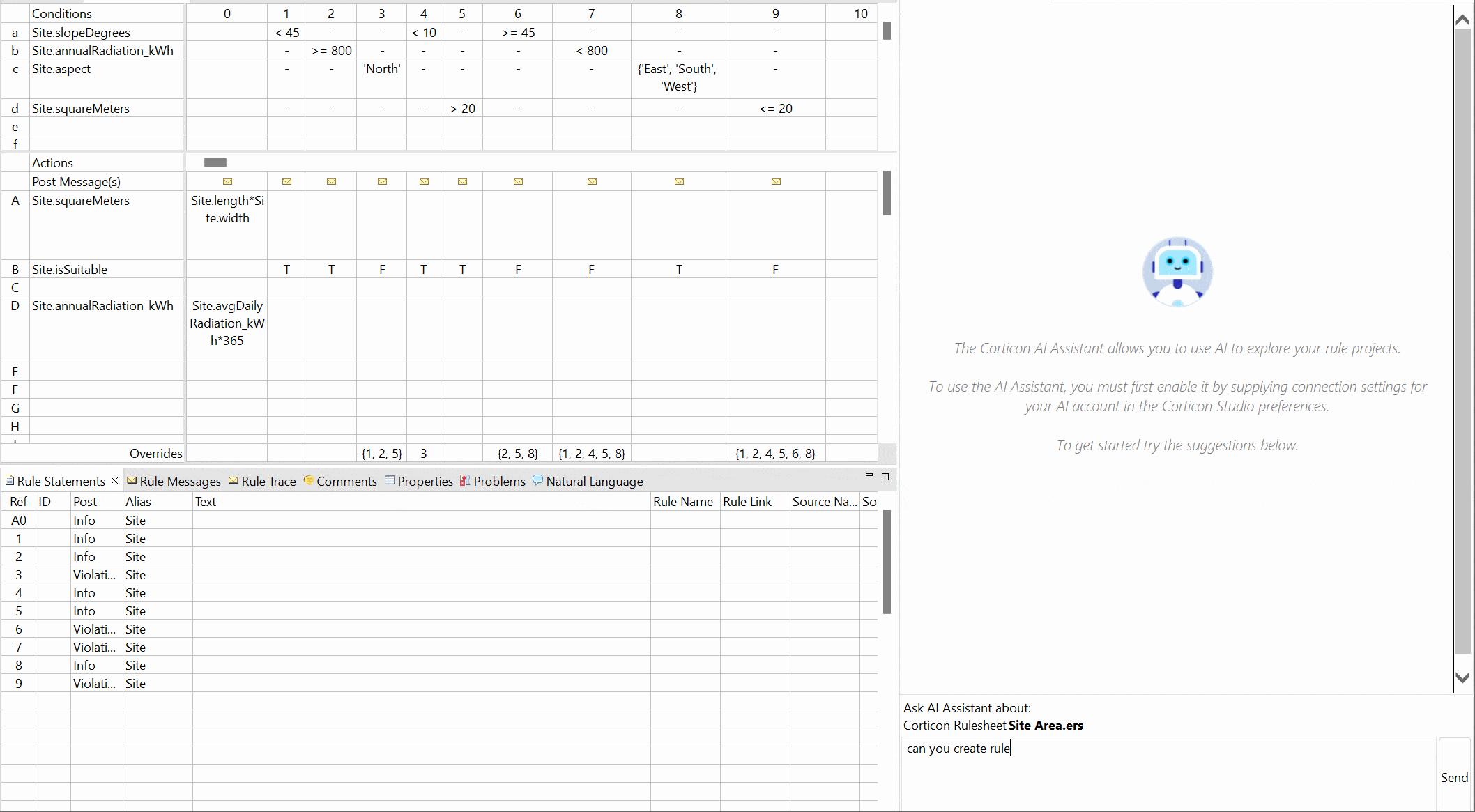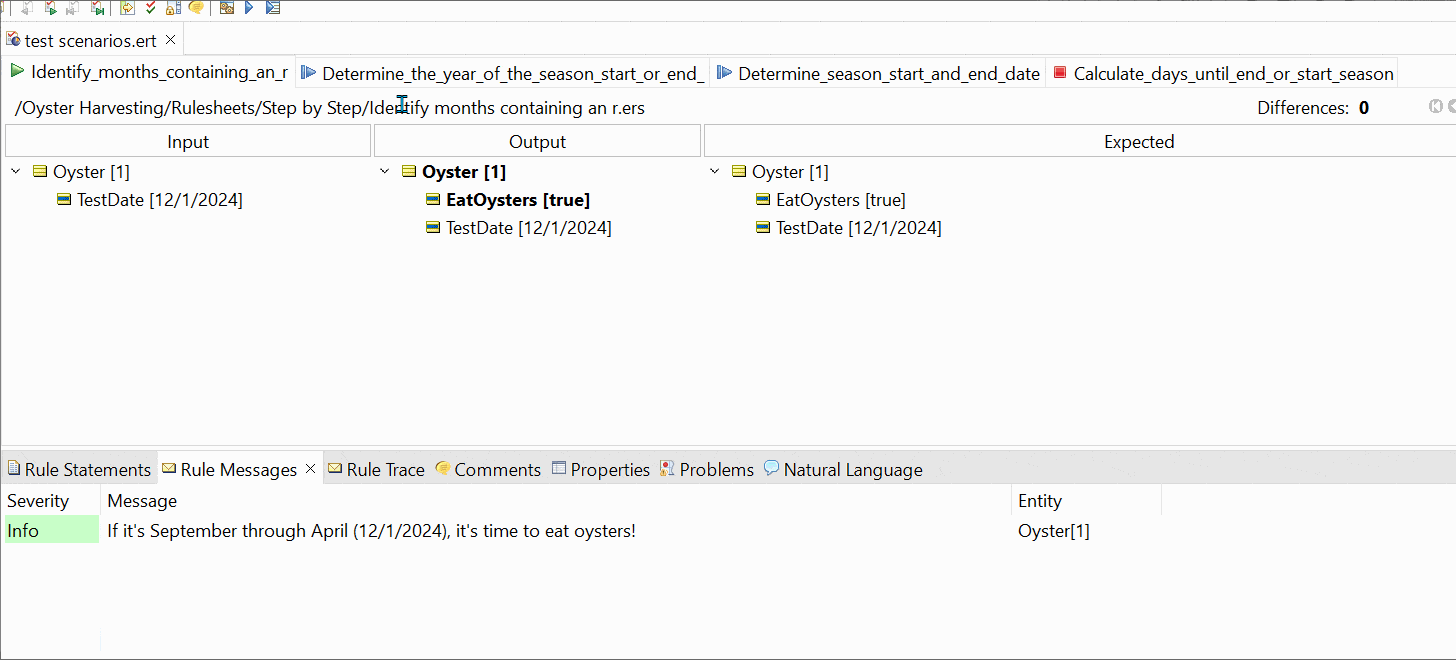Revolutionizing Rule Modeling with Corticon 7.1’s New AI Assistant
Corticon 7.1 introduces the Corticon AI Assistant. See how this new release can help boost productivity and improve your rule design.
Co-authored by Seth Meldon
Corticon 7.1 is here, and it’s bringing an exciting new addition to rule modeling—the Corticon AI Assistant. This new capability expedites rule development, empowers users with advanced insights and shortens rule modeler onboarding. With enhancements that boost productivity, support better rule design patterns, and simplify complex rule projects, Corticon 7.1 provides users with the tools needed to meet organizational goals effectively.
The Power of the AI Assistant
The AI Assistant in Corticon 7.1 enables organizations to drive more value from their AI investment by incorporating AI directly into the Corticon Studio rule authoring environment. Throughout the rule modeling, testing and deployment process, the Corticon AI assistant is a click away to simplify the implementation of complex business rules.
The Corticon AI Assistant isn’t simply a tool for users to interact with as they would through a web browser—it leverages integration with OpenAI to enhance the Corticon Studio experience. User queries to the Corticon AI Assistant incorporate the content of the project that users are actively working on, providing context considered along with the users’ query. Here is a glimpse at some of the countless ways the Corticon AI Assistant boosts rule modelers’ user experiences and productivity:
1. Automate Documentation of Rule Logic
With Corticon, rule modelers have a powerful no-code solution to define logic to automate complex policies and processes. The Corticon AI Assistant can accelerate time to live by generating documentation of rules based upon the rules that users create.
For example, in the screenshot below, the AI Assistant evaluates the rules in a rulesheet which implements rules to evaluate the suitability of a given rooftop for solar panel installation.
Given the prompt to document each rule in plain language, its response can be copied and pasted directly into the rulesheet as rule statements returned when the rule fires, or as natural language definitions to accelerate new user onboarding time.

2. Rule Optimization and Test Case Generation
By analyzing the rule vocabulary elements involved in a specific rulesheet or throughout an entire ruleflow, the Corticon AI Assistant can identify optimal test cases based upon the variables which influence whether or not a rule is triggered.
While Corticon Studio provides a suite of scenario testing capabilities to validate the changes that rules make to data before the rules are deployed into a decision service, users must already have the test input data already in order to import that data into a ruletest’s input, or create test inputs from scratch.
Now, using the AI Assistant, rule modelers can ask for test cases tailor made for their rule assets and its rule vocabulary. In the recording below, the AI assistant analyzes an extensive ruleflow which implements rules for the US affordable care act marketplace, healthcare.gov. Based upon the conditions and actions assigned throughout the many rulesheets, the AI assistant can determine which test cases will provide complete coverage of potential scenarios that may be encountered in production.

3. Additional Quality Gates
By providing real-time feedback on potential issues within rule logic, the AI Assistant allows users to resolve problems early in the development cycle, keeping projects on track and free from preventable errors.
In the recording below, the AI assistant is used to validate the rule modelers’ rulesheet against a rule specification document. Based upon the Type 2 Diabetes Risk Calculation rules pasted into the AI Assistant chat window, the modeler can get a “second set of eyes” to make sure their rules align with the written requirements they were working from.

By embedding AI into Corticon Studio, rule modelers now have a swiss army knife for rule modeling, documentation and troubleshooting.
Enhanced Testing and Management Capabilities
Testing early and often has long been a focus for Corticon users—using the rule tests mentioned earlier, in addition to Corticon’s suite of logical integrity analysis tools. Rule tests can be run against individual rulesheets, entire ruleflows or subsets of ruleflows, and outputs can be compared against expected results and filtered through to determine how specific rule changes impact the broader project.
As rule projects grow, however, it can become more difficult to pinpoint breakpoints in ruleflows made up of large numbers of rulesheets, and to quickly identify and isolate what the data being evaluated by the rules looks like at a certain point during the execution of a ruleflow.
With Corticon’s new rule test generator, rule modelers can generate a ruletest against a ruleflow, made up of distinct testsheets for each rulesheet in that ruleflow, as shown in the following example built with the rules in the Oyster-Eating Season sample available from our GitHub.
When users open a ruleflow, they have a new “Generate Ruletest” option in the Ruleflow dropdown menu.
In the test generation popup, users select a test JSON input file, ruletest file name and whether to run the test with rule trace.
Corticon will now generate a ruletest with four test sheets, corresponding to the four rulesheets in the ruleflow shown in Step 1. By clicking from left to right across these testsheets, we can see the nature of the change made to the initial data by each rulesheet in the order in which they execute.

Additionally, you can manage multiple Corticon Server versions seamlessly in one place, simplifying updates, enabling consistent oversight and enhancing operational efficiency across deployments.
How Corticon 7.1 Stands Apart
Corticon’s AI Assistant is distinct in its dedicated focus on rule development and optimization. Rather than simply adding AI as a peripheral tool, Corticon integrates it deeply into the rule modeling process, providing unique, high-impact benefits that accelerate development, reduce project complexity and offer a holistic understanding of rule projects.
The result is a comprehensive AI-enhanced experience that aligns directly with rule management needs. With Corticon 7.1, organizations are empowered to achieve faster project timelines, streamline documentation, improve rule quality and support better collaboration—all without added overhead.
Discover the Future of Rule Modeling with Corticon 7.1
Corticon 7.1 with its AI Assistant is more than just an update; it’s a significant development in rule modeling and management. By enhancing productivity, simplifying complex processes and integrating AI directly into rule development, Corticon delivers innovative solutions designed to meet the evolving needs of organizations. Whether you’re optimizing existing rules or creating new projects, Corticon 7.1 provides the tools and insights you need to work smarter, faster and more efficiently.
Ready to try these new capabilities yourself? Download the latest version of Corticon for a free 90-day trial!

Hinal Patel
Hinal Patel is a Product Marketing Specialist at Progress, focusing on Progress Corticon specifically. She has been with Progress for two years and is excited to contribute and work on more Progress Corticon projects in the future. Some of her favorite things to do outside of work are hiking, reading, and spending time with family and friends.
